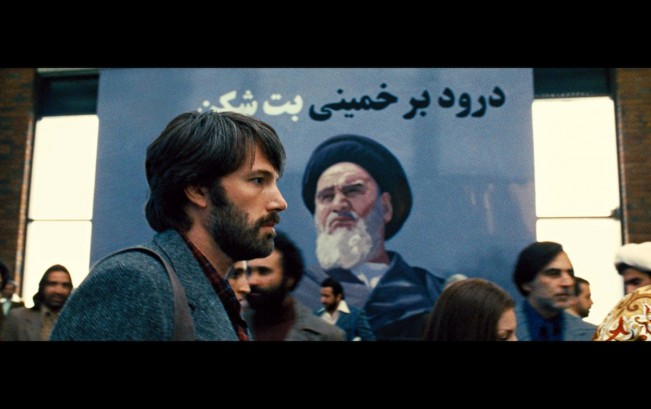

By Mike Wilmington Wilmington@moviecitynews.com
Wilmington on DVDs: Argo
PICK OF THE WEEK: NEW
ARGO (Three and a Half Stars)
U.S.: Ben Affleck, 2012 (Warner Home Video)
In Argo, a movie that more and more seems like the film of thIS year, Hollywood gets to strike back at its political detractors on Fox News and the right wing media gang. Fox may turn news into “fair and balanced” farce, but Argo takes history and turns it into a rousing entertainment. Based on fact — although it’s fact run through the usual big movie embellishing machines — this show tells the story of a C. I. A. ‘exfiltration” expert (director-star Ben Affleck as real-life operative Antonio (Tony) Mendez), who joins forces with an Oscar-winning makeup man (John Goodman as the real-life studio legend John Chambers) and a few other movie people, to cook up a real-life great escape. In it, they assemble a phony movie production in order to rescue six American State Department workers hiding in the Canadian Embassy in Tehran, during the 1979-81 hostage crisis.
Here’s the plot: Mendez proposes to disguise the Americans as part of the production team for a third-rate (no, make that fourth-rate) Canadian Star Wars knockoff called Argo, and sneak them out of the country with fake passports and Swiss airline tickets courtesy of the C.I.A. — with the help of Mendez‘s tolerant boss, Jack O‘Donnell (Bryan Cranston). We watch them try to do that. And the movie, though based on fact, plays like a mad combo of mixed genres: Spy Games espionage stuff, Wag the Dog (government trickery. Close-Up Iranian street film, and The Sting an intricate con game — except that this time the picture puts the C. I. A (and especially Tony Mendez) in a favorable light, instead of tapping into the usual Three Days of the Condor Company nightmare.
What’s unusual about Argo, and gratifying and enjoyable for movie types like most of us, is that it’s both an engrossing historical (or semi-historical) thriller, and a sardonic Hollywood semi-satire. (At one point, Chambers corrects a Siegel miscue on the old aphorism about history beginning as tragedy and repeating and farce and notes that it’s a quote from Marx. Siegel replies, “Groucho?“) And, executing a script that reportedly includes 120 speaking parts in several languages, while employing s cinematic style that alternates rapid cutting with restless long tracking shots, the moviemakers give the movie a virtuoso gleam, mounting tension, but also a sense of fun. Argo covers a lot of ground with those tracks and pans, with the movie following and making lucid the dramatic tensions among Mendez, the six fugitives, and the Canadian embassy people, and outside, The C. I. A operatives and their opposite numbers in the Iranian police.
Who would have thought that Affleck, along with his old Cambridge buddy Matt (Bourne) Damon, would wind up becoming one of the current movie kings of the spy thriller genre? Argo was produced and directed by Affleck, who underplays his part, while sporting a ‘70s counter-culture late Beatle beard and long hair — and if Affleck rang the bell in his last directorial effort, the lacerating Boston gang movie The Town, he really seals the deal here. Argo entertains us in so many ways, while working in so many genre and tonal shifts, that it’s no wonder the film has built up a big constituency. It’s got a great subject: It’s about how movies and real life can intersect, and its whole dramatic structure is built on that main theme.
By now, Argo looks like pretty much of a shoo-in for the Best Picture Oscar this year, so it may seem like sheer crankiness on my part, if I say that I think that Lincoln or The Master and several others would be worthier choices. That’s not to say that I think Argo is a bad or mediocre movie, or that I’m all set to rake it over the coals for transgressions of cinema and history. I’m not. Argo is a good picture, I liked it, and I’d recommend it to (almost) anybody. I’m aware of its deviations from the historical record: how it short-shrifts both New Zealand and Great Britain on credit for the escape, and how it concocts utterly fictional action or suspense scenes like the Tehran angry crowd bazaar sequence and the hell-on-wheels airport climax. I don’t think they spoil the picture, though. (I’d object to them, but for different reasons.) After all, despite the fact that the Argo is based on Mendez’s book about the operation (“The Master of Disguise“) and despite the fact that it includes part of an interview between Affleck and Jimmy Carter (who was U. S. President during the crisis), it isn‘t a documentary and shouldn‘t be judged as one. It isn’t even Fox News.
The reason Argo has accumulated so many pre-Oscar prizes, and seems now so far ahead of most of the field, I think, is because it makes recognizable Hollywood guys, like Goodman’s Chambers and the fictitious producer Lester Siegel (Alan Arkin), look both heroic and funny. I’s a movie almost everybody in the Academy is prone to like, unlike Lincoln (which might be accused of Oscar-mongering) and The Master (which might be carped at as obscure and pretentious) and Zero Dark Thirty (which might be called for dubious politics). Also, I hate to belabor the obvious, but a lot of voters may feel that Spielberg’s movies have gotten their quota of Oscars least for the time being, and he doesn’t really need another one — and that Argo is a movie whose time has come. Even so, Affleck was strangely stiffed for an Academy directorial nomination this time — and had he gotten the nomination, the huige actor voting population might have put him over.
Hollywood left-wingers may also be more skittish about voting the big prize to Lincoln, a movie that says you have to play somewhat dirty or off the map to win crucial political congressional battles. But Argo seemingly has all bases covered. It’s well crafted, entertaining, smart, politically savvy, exciting and funny (thanks to those two wonderful performances by Goodman and Arkin). It’s also popular with audiences — and without resorting to super-heroes or sex bombs or horror show massacres. It’s a movie that gets you on the hook and keeps you there, the kind of show most Hollywood professionals would love to have on their resumes. And it has an attractive pedigree itself. Not only are the immensely likable Goodman and Arkin around and Affleck’s name at the top of the credits, so is George Clooney‘s, as one of the producers.
The whole idea of Oscar-slanting or Oscar-mongering — of making a film largely because it supposedly has the elements that attract Oscar voters — seems to me somewhat overblown and overused itself. There are plenty of movies that, in retrospect, probably deserved Oscars and didn’t get them — and my all-time favorite film, Citizen Kane, is at the top of that list. But there are also plenty of Best Picture Oscar-winners, that went on to become c1assics, or will become classics: movies like Casablanca, Rebecca, How Green Was My Valley (the movie that beat Kane), Gone With the Wind, The Best Years of our Lives, An American in Paris, On The Waterfront, The Apartment, Lawrence of Arabia, The Godfather and The Godfather 2, One Flew Over the Cuckoo‘s Nest, Platoon, The Last Emperor, Unforgiven, Schindler’s List and, more recently, The Lord of the Rings: The Return of the King and The Departed. The Academy has a better record than it’s usually given credit for — at least by some critics — and Academy voters are probably voting for Argo for a very good reason. They like it. Most critics liked it too. As I said, I liked it myself.
But I wouldn’t have voted for it myself (for Best Picture), because I couldn’t buy two of its big showpiece sequences (as fiction, not as history): the turbulent excursion of the phony filmmakers through the Tehran bazaar, and the last-minute nail-biter at the Airport, when airport guards are minutes away from catching them. These scenes bother me not because they’re fictional and made-up, but because, to me, they don’t make sense. I don’t understand why a Star Wars knockoff needs location scenes in a crowded bazaar (wasn’t it the desert that they wanted?), or why the Iranian cops at the airport — who are shown hurtling through crowds and smashing through windows while desperately trying to catch the plane — .don’t just radio somebody at the control tower, or nearer the runway. I’m not saying scenes like that shouldn‘t be invented and included (I enjoyed both of them, as sheer illogical but exciting suspense set-pieces), just that, for a Best Picture Oscar winner, they should be better explained.
Anyway, despite my carps, it just doesn’t bother me that the movie was fictionalized or that Affleck and the people who made Argo may have wanted an Oscar, and may well get a few. I’d much rather see more movies like this one, than more of the trash we usually get each week. And I’d rather see more moviemakers at least try for Oscar quality, than deluge us with formula-drenched, addle-brained, opportunistic nonsense. Questioning the Oscars is fine — we should question more of everything, including the C. I. A. — but one of the reasons we look forward to the Academy Award Show every year, is that it’s fun to know what the pros think. Especially if they’re like Goodman and Arkin in Argo: solid movie professionals who can win the good fight, but also make us laugh.
Extras: Commentary; Featurettes; Feature-length picture-in-picture.















